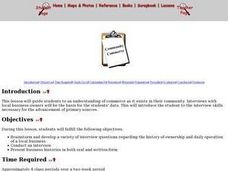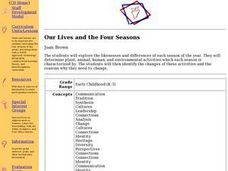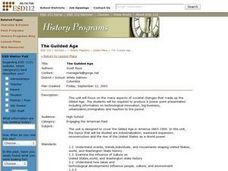Curated OER
A Share in America
Learners examine map - reflect on why English colonist kept coming to America (scarcity of land in England / seemingly endless land in America)
Recite line from English poem. They discuss English attitude towards Indians and their lands.
Curated OER
Time, Talent, Treasure, and Economics
Students examine and trace the origin of an item of clothing. They write, illustrate, and publish a book describing the trade flow that brought their item of clothing to the United States.
Curated OER
Community Commerce
Sixth graders explore commerce in their own community. They interview local business owners and collect data about their town. Students research the history of a local business and its daily operation. They prepare a presentation to...
Curated OER
Social Studies Word Cards
In this social studies worksheet, students cut apart 50 word cards. All have words which pertain to citizenship and living in a community. There are no definitions provided.
Curated OER
Delivering a Persuasive Speech
To prepare to deliver a persuasive speech, class members examine not only how to craft a speech, but consider body language, articulation, pronunciation, pitch, pace, and volume as well.
Curated OER
Mexican Independence Day
Students realize that countries have celebrations unique to them and demonstrate their understanding of the concept of tradition. They identify a family tradition that is important to each of them and demonstrate their understanding of...
Curated OER
George Washington Carver
Second graders participate in an investigation of George Washington Carver and his life. They conduct research using the provided text. Specifically, 2nd graders use the large print and pictures to strengthen reading comprehension. They...
Curated OER
"I've Been Working on the Railroad" - Federal Land Grants and the Construction of the Illinois Central Railroad in Mid-nineteenth Century Illinois
Eleventh graders, in groups, design a self-sufficient community. Groups present the communities they've designed. They compare and contrast the communities presented. They research the theories of Johann Heinrich von Thunen online and...
Curated OER
Our Lives and the Four Seasons
Students compare and contrast the four seasons. Using this information, they determine the plant, animal and environmental activities that can be enjoyed in each season. They discuss why the seasons must change and how humans adapt to them.
Curated OER
Workers in Factories During the Gilded Age
Seventh graders experience what life was like in the factories during the Gilded Age. They explore the reasons behind the move for work place reforms during the Progressive Era. Students discuss the factors that led to work place reforms.
Curated OER
The Guilded Age
Students examine the Gilded Age in American history. Using the internet, they research the innovations, business, and immigration during this time period. They create a PowerPoint presentation to share their information with the class.
Curated OER
Economic and Social Changes in the High Middle Ages
Students investigate the economic and social changes that occurred in the High Middle Ages. They listen to a lecture and take notes, and in small groups compose a medieval charter and role-play its presentation to the class.
Curated OER
Pile 'em High?
Students explore the concept of architectural heritage. For this architecture lesson, students visit selected websites to compare and contrast the architectural features in world cities.
Curated OER
Inside the Vault-Employment Growth in America: What Determines Good Jobs?
Students examine employment growth and the economy. After a teacher lead discussion, students explore types of jobs and their correlation with education level. Job qualifications for both high-paying and low-paying careers are researched.
Curated OER
What Is Technology?
Second graders engage in a literature study that is concerned with transmitting new knowledge about modern technology. They identify different forms of technology and how it is used in everyday society. The lesson includes vocabulary...
Curated OER
Investment Appraisal
Pupils use different methods of investment appraisal to make business decisions, and also to develop higher order skills through having to consider other factors, apart from quantitative methods, that a business might have to consider in...
Curated OER
Travel Brochures
Third graders divide into teams and select a country to research. They read and review "Notetaking Skills" and begin their research. Next, they work together and share the information they have located. Each team fills in a template with...
Council for Economic Education
Econ Ed Link: The Civil War: A War of Resources
The North won the Civil War in large part due to its superior resources. For this lesson students will learn the difference between capital resources, human capital, and natural resources. They will investigate and compare the resources...
Council for Economic Education
Econ Ed Link: Mystery Workers: Productive Resources
This website focuses on productive resources which are divided into three categories, natural, human, and capital.
Council for Economic Education
Econ Ed Link: Economic Spotter: Resources During Wwii
This is a lesson plan that deals with scarcity during WWII. Natural, human, and capital resources are discussed.
Council for Economic Education
Econ Ed Link: Those Golden Jeans
Check out this informative economics lesson plan designed to review the three productive resources--natural resources, human resources, and capital resources--needed to produce goods and services.
Federal Reserve Bank
Federal Reserve Bank of St. Louis: Tortilla Factory [Pdf]
This lesson accompanies a story by Gary Paulsen called Tortilla Factory, and teaches students to identify the different types of resources (human, capital, natural, etc.) that go into creating corn tortillas and other products.
University of Minnesota
University of Minnesota: 2.1 Factors of Production: Principles of Economics
The three factors of production-labor, capital, and natural resources. Explain the role of technology and entrepreneurs in the utilization of the economy's factors. Labor is the human effort that can be applied to the production of goods...






















